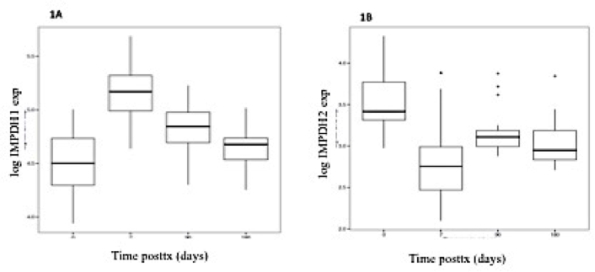Marked Alterations in Gene Expression in Peripheral Blood Leukocytes of Kidney Transplant (tx) Recipients Following Mycophenolic Acid (MPA) Treatment.
1University of Minnestoa, Minneapolis
2MMRC, Hennepin County Medical Center, Minneapolis
3Rho.
Meeting: 2016 American Transplant Congress
Abstract number: D264
Keywords: Gene expression, Immunosuppression, Kidney/pancreas transplantation, Mycophenolate mofetil
Session Information
Session Name: Poster Session D: Poster Session II: Kidney Complications-Other
Session Type: Poster Session
Date: Tuesday, June 14, 2016
Session Time: 6:00pm-7:00pm
 Presentation Time: 6:00pm-7:00pm
Presentation Time: 6:00pm-7:00pm
Location: Halls C&D
MPA exerts its immunosuppressive activity by inhibiting IMPDH2 enzyme, halting DNA synthesis in T and B lymphocytes. Cell culture models have shown MPA effects on expression of multiple genes. Genes affected by MPA in a tx population are not known.
We performed RNA sequencing (RNAseq, Illumina) on PBMCs from tx recipients (n=43) receiving MPA, CNI, +/- steroids at pretx, week 1, months 3 and 6 posttx. Plasma MPA trough concentrations (total, free, acyl) and IMPDH enzyme activity in PBMC were measured. Expression of 112 genes in the cell cycle pathway, and IMPDH1 and IMPDH2 were chosen for analysis. Gene expression (as log fragments per kilobase per million reads normalized) was determined at each time posttx. A linear mixed effect model was used to associate fold changes from baseline gene expression with MPA concentrations and IMPDH activity at each time point.
Gene expression was highly variable between recipients. IMPDH2 expression decreased (p=10-11) whereas IMPDH1 expression increased (p=10-18) after MPA administration (Fig1A-B). IMPDH gene expressions or IMPDH enzyme activity were not associated with MPA troughs. IMPDH enzyme activity did not change substantially over time but was associated with expression of CD28 at week 1 (p=0.001 and FDR=0.1). IMPDH gene expression changes were transient returning to near pretx levels by months 3 and 6. Similarly, many genes in the cell cycle pathway also showed a transient change at week 1 following MPA administration, returning to near pretx levels at later time points. IMPDH enzyme activity at week 1 significantly influenced the targeted gene set (p=0.03) as determined by enrichment analysis.
IMPDH2 expression decreased after MPA. Expression or IMPDH enzyme activity was not associated with MPA concentrations. A larger cohort is needed to study the importance of these profound but transient changes in gene expression in the early posttx period. Sponsored by NIAID and NIGMS. 
CITATION INFORMATION: Sanghavi K, Wu B, Dorr C, Muthuswamy A, Guan W, Schladt D, Remmel R, Ilke D, Matas A, Israni A, Oetting W, Jacobson P. Marked Alterations in Gene Expression in Peripheral Blood Leukocytes of Kidney Transplant (tx) Recipients Following Mycophenolic Acid (MPA) Treatment. Am J Transplant. 2016;16 (suppl 3).
To cite this abstract in AMA style:
Sanghavi K, Wu B, Dorr C, Muthuswamy A, Guan W, Schladt D, Remmel R, Ilke D, Matas A, Israni A, Oetting W, Jacobson P. Marked Alterations in Gene Expression in Peripheral Blood Leukocytes of Kidney Transplant (tx) Recipients Following Mycophenolic Acid (MPA) Treatment. [abstract]. Am J Transplant. 2016; 16 (suppl 3). https://atcmeetingabstracts.com/abstract/marked-alterations-in-gene-expression-in-peripheral-blood-leukocytes-of-kidney-transplant-tx-recipients-following-mycophenolic-acid-mpa-treatment/. Accessed July 18, 2025.« Back to 2016 American Transplant Congress
